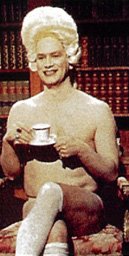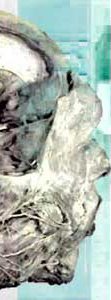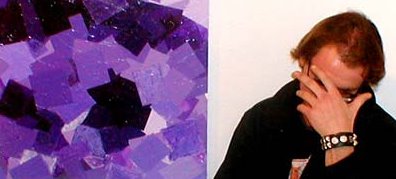Avant-Garde - Why is it so pretentious? (August 2006)
Avant-Garde
Function: noun
Etymology: French, vanguard
: an intelligentsia that develops new or experimental concepts especially in the arts
Experimental
Function: adjective
1 : of, relating to, or based on experience or experiment
2 a : serving the ends of or used as a means of experimentation <
b : relating to or having the characteristics of experiment : TENTATIVE <
 As most of you may already know, 'Avant-Garde' and 'Experimental' are, in filmmaking, terms used to describe a specific genre of film. Frequently they involve plotless, unexplained tales or are unrealistic, non-linear vehicles for the just plain weird. As often as not, this is the intent.
As most of you may already know, 'Avant-Garde' and 'Experimental' are, in filmmaking, terms used to describe a specific genre of film. Frequently they involve plotless, unexplained tales or are unrealistic, non-linear vehicles for the just plain weird. As often as not, this is the intent. As for the terms, 'Avant-Garde' means something new, on the forefront, be it in music, politics or even cuisine. The definition also necessitates a style that is forever changing. Painting in a style like Picasso's now could be called 'Experimental', but could technically no longer be 'Avant-Garde', as it has been done before, and no longer pushes the boundaries of the art world, and ultimately this is the point of such experiments: it is a movement that hopes to lead the way in inspiring others to create something new and different, rather than honing an existing craft or style. The purpose of Avant-Garde and Experimental film is art before plot.
 A typical popular example of such a film is Maya Deren's Meshes Of The Afternoon, a study of the thin line between dream and reality. In it, there is very little to explain such nonsensical scenes as the character crawling through grass and plants only to end up on a dinner table, with the guests laugh at her. The point is the journey, intended to confuse the part that is a dream from that which is real.
A typical popular example of such a film is Maya Deren's Meshes Of The Afternoon, a study of the thin line between dream and reality. In it, there is very little to explain such nonsensical scenes as the character crawling through grass and plants only to end up on a dinner table, with the guests laugh at her. The point is the journey, intended to confuse the part that is a dream from that which is real. Expressionism, Surrealism, Dada and Post-Modernism are some of the best examples of artistic styles that were once Avant-Garde, and are even a century later still considered as such, or named Experimental.
Every style of film has its flaws, however. Musicals, besides the singing and dancing, tend to have happy endings and relatively light plots, which may not appeal to some. Action films tend not to focus on character development. Thrillers are so rooted in suspense that they can seem long and drawn out. Experimental film may suffer from the greatest flaw of all: resistance by the mainstream, and since these films aren't offered at the large Mega-Mart Cinemas, it becomes ever more rare.
Most films are stories. They have a beginning, a middle and an end, and we tend to know what's going on as the story is told. Not so with Experimental film. In fact, one of the most famous Surrealist films, Un Chien Andalou, directed by Bunuel and Dali was a montage film incorporating death, decay and sexuality and was made specifically to confound the audience, to assume nothing.

"Surrealism is destructive, but it destroys only what it considers to be shackles limiting our vision." - Salvador Dali
 If you ask me, Experimental film is not a popular medium among common moviegoers as it forces the dominant logical left brain to categorize the symbolic or even the intentionally uncategorizable. Instinctively, this side of our brain needs to explain and understand what is happening around them, and when it cannot, it dislikes, distracts, or even fears, causing symptoms of boredom or restlessness in the viewer. That side of the mind wants to stop watching. Those who work more often with the right brain, like artists for example, are more accustomed to this passive observation, and will be more likely to appreciate it.
If you ask me, Experimental film is not a popular medium among common moviegoers as it forces the dominant logical left brain to categorize the symbolic or even the intentionally uncategorizable. Instinctively, this side of our brain needs to explain and understand what is happening around them, and when it cannot, it dislikes, distracts, or even fears, causing symptoms of boredom or restlessness in the viewer. That side of the mind wants to stop watching. Those who work more often with the right brain, like artists for example, are more accustomed to this passive observation, and will be more likely to appreciate it. So why is Avant-Garde / Experimental film so pretentious?
It's not. You should be proud to like something that's different. That makes you better... I mean special. I will admit it's a difficult genre to love as a whole, but I'll keep watching, even if it pisses me off from time to time. We can say the same about every film genre, they all have their great and terrible moments.
Those of you who've been reading this in hopes to earn a champion in your opinion that this genre is 'no good' might want to consider scrolling down to the following two posts I studied for this Blog-A-Thon, reviews of excellent Experimental films, the Japanese Animé Angel's Egg and the Brother's Quay drama Institute Benjamenta.
Along my studies I have seen quite a bit of Experimental cinema, and if you care to read a review or two here is a short list of my favorite old and new, sensical and nonsensical, short and feature length films that got me this far in my greater appreciation for film as a whole, and Art-Film specifically:
The Films of The Brother Quay (1987) - Heavily influenced by Jan Svankmeyer, this is a series of collected shorts, including their most famous stop-motion puppetry films.
The Cabinet Of Dr. Caligari (1920) - This simple silent thriller murder mystery is considered one of the all-time top films of the German Expressionist movement.
The Secret Adventures Of Tom Thumb (1993) - Also very reminiscent of Jan Svankmeyer's works, we have the stop-motion tale of Tom Thumb. Rather than the joyous adventures we expect, he faces G-men and the horrors of vivisection laboratories. A great yet dark tale, highly stylized, and not too hard to understand.
Avant Garde: Experimental Cinema Of The 20s And '30s (1921-1939) - Feel like getting jumped in to the beginnings of the Avant-Garde style of cinema? This is the perfect way of doing it. A word of caution though: don't let any one short detract you from the gems in this collection.
The Short Films Of David Lynch (1967-1995) - Any Eraserhead or Naked Lunch fan will be sorely missing out if they miss this collection of this genius' early short works.
Along my studies I have seen quite a bit of Experimental cinema, and if you care to read a review or two here is a short list of my favorite old and new, sensical and nonsensical, short and feature length films that got me this far in my greater appreciation for film as a whole, and Art-Film specifically:
The Films of The Brother Quay (1987) - Heavily influenced by Jan Svankmeyer, this is a series of collected shorts, including their most famous stop-motion puppetry films.
The Cabinet Of Dr. Caligari (1920) - This simple silent thriller murder mystery is considered one of the all-time top films of the German Expressionist movement.
The Secret Adventures Of Tom Thumb (1993) - Also very reminiscent of Jan Svankmeyer's works, we have the stop-motion tale of Tom Thumb. Rather than the joyous adventures we expect, he faces G-men and the horrors of vivisection laboratories. A great yet dark tale, highly stylized, and not too hard to understand.
Avant Garde: Experimental Cinema Of The 20s And '30s (1921-1939) - Feel like getting jumped in to the beginnings of the Avant-Garde style of cinema? This is the perfect way of doing it. A word of caution though: don't let any one short detract you from the gems in this collection.
The Short Films Of David Lynch (1967-1995) - Any Eraserhead or Naked Lunch fan will be sorely missing out if they miss this collection of this genius' early short works.
This post, as well as the next two, is part of the Avant-Garde Blog-A-Thon. For a complete listing, visit Girish.



<< Home